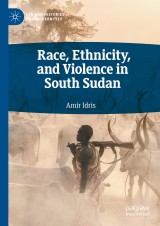Details
Race, Ethnicity, and Violence in South Sudan
African Histories and Modernities
|
117,69 € |
|
| Verlag: | Palgrave Macmillan |
| Format: | |
| Veröffentl.: | 19.06.2024 |
| ISBN/EAN: | 9783031570414 |
| Sprache: | englisch |
| Anzahl Seiten: | 256 |
Dieses eBook enthält ein Wasserzeichen.
Beschreibungen
<p>The purpose of this book is to understand how and why “liberators” of South Sudan have become perpetrators of ethnically driven violence. How and why did violence happen immediately after independence in South Sudan?</p><p>South Sudan slid into civil war in December 2013, just two years after winning its hard-won independence. A great deal has been written about the conflict and violence of this period, much of which emphasizes the notion that the root causes of the conflict can be traced to the ethnic division and hatred among the population or the lack of state capacity to manage ethnic diversity and hostilities. However, the existing literature exhibits important analytical gaps, focusing primarily on the state of the violence and the immediate political history of South Sudan dating back to its political independence in 2011, but lacking critical analysis of historical and anthropological interpretations of state and society. This book addresses these gaps in knowledge and understanding and in so doing seeks to explain how and why liberators become perpetrators of violence, and how the intersection of the legacies of slavery, colonialism, and national liberation struggle contributed to violence in South Sudan. Through a comprehensive exploration of identity and violence within the broader context of state formation, the book sheds light on why those who sought sovereignty may turn against their own, drawing parallels with colonial discourse. It aspires to provide nuanced frameworks and empirical insight for scholars, students, practitioners, and policymakers engaged in South Sudan, politics, development, and peacebuilding.</p><p><br></p>
<p>Chapter 1. Introduction.- Chapter 2. The Invention of South Sudan.- Chapter 3. The Formation of a Racialized State.-Chapter 4. Racialized Nationalism and Nation-Building.- Chapter 5. Ethnic Violence as Politics—December 2013 Massacre.- Chapter 6. De-inventing South Sudan.</p>
<p>Amir Idris is a Professor of African History and Politics in the Department of History at Fordham University in New York City. He is the author of <i>Conflict and Politics of Identity in Sudan</i>. Among his other books are <i>South Sudan: Post-Independence Dilemmas, Identity, Citizenship, and Violence in Two Sudans</i>, and <i>Sudan’s Civil War: Slavery, Race, and Formational Identities</i>.<br></p>
The purpose of this book is to understand how and why “liberators” of South Sudan have become perpetrators of ethnically driven violence. How and why did violence happen immediately after independence in South Sudan?<div><br><div>South Sudan slid into civil war in December 2013, just two years after winning its hard-won independence. A great deal has been written about the conflict and violence of this period, much of which emphasizes the notion that the root causes of the conflict can be traced to the ethnic division and hatred among the population or the lack of state capacity to manage ethnic diversity and hostilities. However, the existing literature exhibits important analytical gaps, focusing primarily on the state of the violence and the immediate political history of South Sudan dating back to its political independence in 2011, but lacking critical analysis of historical and anthropological interpretations of state and society. This book addresses these gaps in knowledge and understanding and in so doing seeks to explain how and why liberators become perpetrators of violence, and how the intersection of the legacies of slavery, colonialism, and national liberation struggle contributed to violence in South Sudan. Through a comprehensive exploration of identity and violence within the broader context of state formation, the book sheds light on why those who sought sovereignty may turn against their own, drawing parallels with colonial discourse. It aspires to provide nuanced frameworks and empirical insight for scholars, students, practitioners, and policymakers engaged in South Sudan, politics, development, and peacebuilding.</div><div><br></div></div><div><b>Amir Idris</b> is a Professor of African History and Politics in the Department of History at Fordham University in New York City. He is the author of <i>Conflict and Politics of Identity in Sudan</i>. Among his other books are <i>South Sudan: Post-Independence Dilemmas, Identity, Citizenship, and Violence in Two Sudans</i>, and <i>Sudan’s Civil War: Slavery, Race, and Formational Identities</i>.<br></div>
Provides a fresh and innovative account on the history of South Sudan Employs historical and anthropological methodologies in the analysis of Sudanese violence Utilizes primary and secondary sources as well as interviews
Diese Produkte könnten Sie auch interessieren:

Chisto rossiyskoe prestuplenie: Samye gromkie i zagadochnye ugolovnye dela XVIII - XX vekov

von: Eva Merkacheva

9,99 €
















